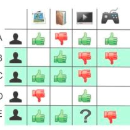Collaborative filtering is the de facto standard for analyzing users' activities and building recommendation systems for items. In this work we develop Sliced Anti-symmetric Decomposition (SAD), a new model for collaborative filtering based on implicit feedback. In contrast to traditional techniques where a latent representation of users (user vectors) and items (item vectors) are estimated, SAD introduces one additional latent vector to each item, using a novel three-way tensor view of user-item interactions. This new vector extends user-item preferences calculated by standard dot products to general inner products, producing interactions between items when evaluating their relative preferences and bringing fundamental new information into recommendation. SAD reduces to state-of-the-art (SOTA) collaborative filtering models when the vector collapses to 1 (no new information), while in this paper we allow its value to be estimated from data. The proposed SAD model is simple, resulting in an efficient group stochastic gradient descent (SGD) algorithm. We demonstrate the efficiency of SAD in both simulated and real world datasets containing over 1M user-item interactions. By comparing SAD with seven alternative SOTA collaborative filtering models, we show that SAD is not only able to more consistently estimate personalized preferences, but also produce more accurate personalized recommendations. We release the model and inference algorithms in a Python library https://github.com/apple/ml-sad.
翻译:合作过滤是分析用户活动和建立项目建议系统的实际标准。 在这项工作中,我们开发了基于隐含反馈的合作过滤新模式(SAD),即基于隐性反馈的合作过滤新模式。与用户(用户矢量)和项目(项目矢量)的潜在代表值估计的传统技术相比,SAD为每个项目增加了一种潜在的矢量,使用一种全新的三向向宽视图来分析用户-项目互动。这一新矢量将标准点产品计算出的用户项目偏好扩展至一般内部产品,在评价其相对偏好和将基本新信息引入建议时,在项目之间产生互动。SADD在矢量崩溃到1(没有新信息)和项目(项目矢量)时,将合作过滤模式降为状态(SOTA),而在本文中,我们允许从数据中估算其价值。拟议的SAD模型很简单,导致一个高效的组变相梯度梯度梯度梯度下降(SGD)算法。我们在模拟和真实世界数据集(包含超过1M用户/项目互动)时,产生互动。通过将SADAD(SADAD) 更精确的模型,我们只能算算算出一个更精确的模型。




